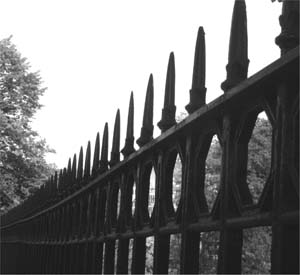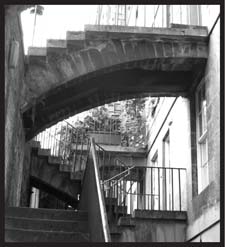Mortal Causes (40 page)
Authors: Ian Rankin

 MORTAL CAUSES
MORTAL CAUSESIt’s Festival time and the streets are heaving with revellers. A prankster is making hoax bomb threats – or maybe there’s something more serious afoot, such as the arrival of a new paramilitary terrorist group. Meanwhile, over in Mary King’s Close, in a secret underground street, a mysterious Latin inscription accompanies a tattooed body, victim of a ‘six-pack’ attack gone bad. And soon Father Conor Leary asks Rebus for help, as outreach worker Peter Cave may be feeling out of his depth on the Pilmuir Gar-B estate, a place where poor Protestants and Catholics live cheek by jowl and there’s an uneasy truce before the division of territory.
To his surprise, Rebus is seconded to the Scottish Crime Squad at Fettes – Edinburgh’s police HQ – who are looking into sectarian gun-running; but soon it becomes clear that Special Branch may have their own ulterior motives, motives they’ve not thought to share with the SCS.
When the murder victim turns out to be the illegitimate son of local gang bigwig Big Ger Cafferty, currently in prison on a murder charge, Big Ger demands a private meeting with Rebus. And still Rebus doesn’t know why DCI Kilpatrick is taking him into his confidence, or quite what the annual parade of an extreme Protestant group, the Orange Loyal Brigade, will yield. Rebus can see there’s a strong connection, but he wonders if he will find the weakest link in the chain before Cafferty can kill whoever butchered his son …
Tackling some difficult issues, sometimes from an unexpected standpoint, in
Mortal Causes
Ian Rankin gives Rebus some of his stiffest challenges yet, to which Rebus can only respond in sometimes surprising ways.
 Discussion points for
Discussion points forMortal Causes
‘
Edinburgh’s history was full of licence and riotous behaviour. But the Festival, especially the Festival Fringe, was different. Tourism was its lifeblood, and where there were tourists there was trouble
.’ Discuss the different kinds of ‘trouble’ that Rebus encounters in
Mortal Causes
.

What is Rebus describing when he thinks about the ‘massive grey nonentity’? And why does it make him pray?

Rebus knows that in theory police work should be a team effort. But, ‘
It wasn’t Rebus’s way. He wanted to follow up every lead personally, cross-referencing them all, taking them through from first principle to final reckoning. He’d been described, not unkindly, as a terrier, locking on with his jaws and not letting go. Some dogs you had to break the jaw to get them off
.’ Discuss.

Rebus seems to like Mairie Henderson – why is this odd?

One of the themes in
Mortal Causes
is sectarianism and religious division in Scotland. How does Ian Rankin use narrative techniques (such as religious imagery) to add texture to this debate? Does DS Siobhan Clarke’s support of Hibs accord with her religious beliefs?
What is Clyde Moncur doing in Edinburgh?

Bearing in mind that ‘mortal’ is a Scottish euphemism for drunkenness, discuss the various implications of the word. And, bearing in mind Rebus’s own love of drink, consider how he feels about caffeine.

Why does Rebus kiss Caro Rattray? What are the implications of his actions?

The relationship between Rebus and Big Ger Cafferty is evolving, as are Rebus’s relationships with DS Siobhan Clarke and Father Leary; look at how Ian Rankin reveals these developments.

Ian Rankin employs a convoluted running joke to do with an octopus, although without the punchline; does it counterbalance the grimmer aspects of the crime story?

